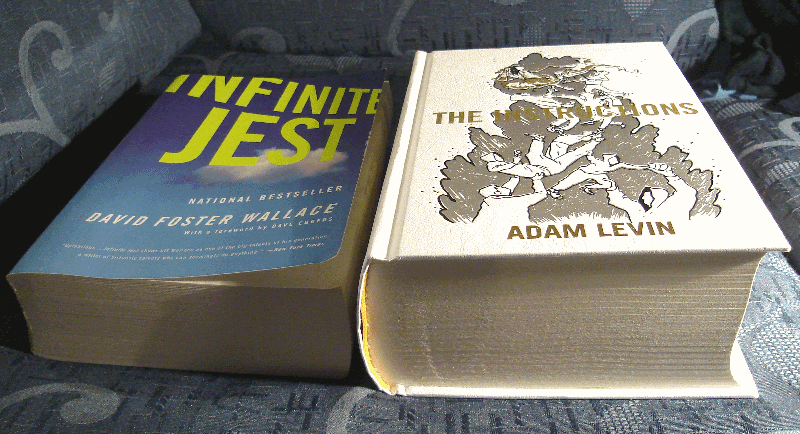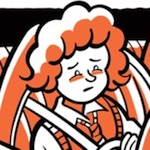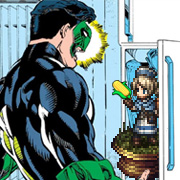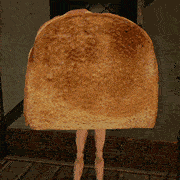|
Bandiet posted:It's fun because of the malapropisms and double meanings, not because of random wacky spellings for words. No, malapropisms and double meanings is Joyce. It reads like someone trying to be Joyce without understanding what made him great. Every sentence was rich in context. That excerpt above could easily be transliterated into normal English without having lost anything. You could not transliterate Finnegan's Wake and keep the meaning.
|
|
|
|

|
| # ? Apr 29, 2024 04:13 |
|
Mel Mudkiper posted:No, malapropisms and double meanings is Joyce. It's a lot simpler than Joyce, so yes, you can easily understand its surface meaning when reading it. But there's definitely room for interpretation, in some self-evident words like "inudibelle", and considering the length of the novel I'm sure that's not all it consists of. It seems to me like a quaint homage to Joyce mixed into the work. I can also imagine the original German might be vastly different in effect.
|
|
|
|
Bandiet posted:I can also imagine the original German might be vastly different in effect. Mate...
|
|
|
|
Bandiet posted:I can also imagine the original German might be vastly different in effect. This was Alan Moore, though. Not Bottom's Dream. I also agree it would be not so interesting if it was just weird spelling, since it would be form over substance. But even that small quote has plenty of fun wordplay, to me. The fact it's readable compared to actual Joyce is a BIG positive point. I was worried because I read reviewers stating they skipped the chapter (it's also one chapter in the book, about 40 pages long). But instead it's a lot of fun to read, and perfectly in context with the voice narrating it. Beside the mishmash of words there are often inversions, like: the tousled egg into her scrambled head. That ironically is somewhat similar to the Shakespeare quote at the beginning of Bottom's Dream: The eye of man hath not heard, the ear of man hath not seen, manís hand is not able to taste, his tongue to conceive, nor his heart to report what my dream was. The fun in reading the quote is how different meanings are being suggested beside the one "translation", and then it also has a pleasant musicality to it too. Abalieno fucked around with this message at 16:06 on Sep 21, 2016 |
|
|
|
That's a lot less poo poo than I thought it was going to be.
|
|
|
|
Mel Mudkiper posted:No, malapropisms and double meanings is Joyce. Nahhh it's got a nice musicality to it, and the misspellings consistently hint to a kind of dreamlike, not-all-there character in a pleasant little marriage of form and function. It's not groundbreaking, it's obvs not Finnegans Wake but it's not completely stupid.
|
|
|
|
Abalieno posted:This was Alan Moore, though. Not Bottom's Dream. In that case, I'm more impressed. Seems like there's some actual effort gone in.
|
|
|
|
He's been writing it for like a decade you think it'd be half-assed?
|
|
|
|
Yeah, if that's all he could manage.
|
|
|
|
Mr. Squishy posted:He's been writing it for like a decade you think it'd be half-assed? This isn't a good argument. Avatar and Star Wars Ep. 1 took a decade to be mediocre. The amount of time invested doesn't always produce great material. I don't have anything against Alan Moore, I just think that reading it would be a waste of time better spent on better books. I feel like the reviews for Jerusalem are more for his celebrity than the actual book, but I'm not reading it, so what do I know.
|
|
|
|
CestMoi posted:Nahhh it's got a nice musicality to it, and the misspellings consistently hint to a kind of dreamlike, not-all-there character in a pleasant little marriage of form and function. It's not groundbreaking, it's obvs not Finnegans Wake but it's not completely stupid. Yeah, I am probably being a little too cynical about it. If it's just a section done as a part of a rhetorical tapestry I can dig it. I thought the whole loving book looks like that, which set off my "are you kidding me?" siren.
|
|
|
|
I think on of my issues with colossal novels is that people seem to engage with them as totems rather than as fiction. Like, half the time people talk up Infinite Jest they talk up its length, its footnotes, its scope. There is never a mention of it having one of the best descriptions of suicidal depression ever. Of it having a very thoughtful meditation on the psychology of addiction and recovery. Almost no one ever talks about how the primary theme of the book is about the struggle of intelligent and self-aware people to deal with their compulsions despite being cognizant of their consequences. The entire novel is about the failure of rational people to rationalize away their own harmful urges, and no one ever brings this up. Its always just "big book is big and is like Sufjan Stevens"
|
|
|
|
CestMoi posted:That's a lot less poo poo than I thought it was going to be. Yeah. but im still not gonna read it
|
|
|
|
Mel Mudkiper posted:There is never a mention of it having one of the best descriptions of suicidal depression ever. Of it having a very thoughtful meditation on the psychology of addiction and recovery. Almost no one ever talks about how the primary theme of the book is about the struggle of intelligent and self-aware people to deal with their compulsions despite being cognizant of their consequences. The entire novel is about the failure of rational people to rationalize away their own harmful urges, and no one ever brings this up. Its always just "big book is big and is like Sufjan Stevens" Because it's A LOT more than that. And because of its nature it's really hard to wrap up with a neat definition. You just mostly described one aspect, and in my opinion not even a salient one.
|
|
|
|
Mel Mudkiper posted:I think on of my issues with colossal novels is that people seem to engage with them as totems rather than as fiction. I'm a plebe so I usually just talk about scenes I like, like Eschaton, JOI pretending to be a therapist with his disguise melting off, Orin's ironic punishment where he yells the line from 1984 and the spy chick rolls her eyes, JOI's filmography, the check-ins with the people slowly falling victim to the entertainment, etc. I've actually always seen the length as an embarrassing part, like I want to recommend it to friends and family but "hey read this weird thousand page book with tons of footnotes and no actual ending" will probably make them think I'm a huge dork (moreso than the mountain of evidence they already have).
|
|
|
|
Abalieno posted:and in my opinion not even a salient one. We've seen the value of your opinions before
|
|
|
|
Mel Mudkiper posted:I think on of my issues with colossal novels is that people seem to engage with them as totems rather than as fiction. I admit, the length is probably what got me to start reading Infinite Jest, but the first two scenes were so good that I knew I wouldn't regret reading it, and wouldn't be returning it to the library unfinished. That prediction proved to be true, but I wish I could have remembered the book in more detail than I do now. I'd love to reread the suicidal depression scene you're talking about, for instance.
|
|
|
Solitair posted:I admit, the length is probably what got me to start reading Infinite Jest, but the first two scenes were so good that I knew I wouldn't regret reading it, and wouldn't be returning it to the library unfinished. That prediction proved to be true, but I wish I could have remembered the book in more detail than I do now. I'd love to reread the suicidal depression scene you're talking about, for instance. It's one of those things where when suicidally depressed people read it, they go "wow whoever wrote this dialogue for this character was suicidally depressed, and I should know". Really almost impossible to be that good at describing a neuropsychological condition in plain language. I have trouble reading the Kate Gompert scenes, and I've been through IJ many times.
|
|
|
|
|
Mel Mudkiper posted:We've seen the value of your opinions before The nature of IJ, linking together so many themes, aspects and characters means that every reader will take from the book different things, and the personal list of priorities of that reader will be different from those of another. That confirms why IJ is an exceptional book, as in, it's an exception. I personally don't know of any other book that plays on so many different levels that it simply boggles the mind. But for example, that theme of "addiction" branches out in multiple directions, and you can focus and give importance to those different branches instead. One aspect is that DFW loves math and science, and there's an undercurrent to all of this. The "annular" symbol, the structure of the book where the end ideally leads back to the beginning. It's just structure, but then it becomes theme. For example in "The Depressed Person" story DFW describes, if more indirectly and impersonally, the same self-feeding process. That theme structures IJ. Lots of the addictions and problems the book describes are all of a self-feeding, recursive "shape", from the compulsive habits of Avril to, I think, Pemulis who has to write an essay about how an agoraphobic kleptomaniac can manage to do his thing. It's all about recursion and double binds, same as this theme is played out with that model of annular fusion that seems to produce "infinite energy", that's recursion too. And that was invented by JOI after looking at doorknob revolving on itself. That's the fun of IJ: a single theme is played on so many different levels, and the reader decides where his attention focuses. DFW was trying hard to reconcile his obsessive interests about complex structures and virtuosity to a certain humanism (and so Mario). You can explore either way. For me for example a main theme is the discussion between Steeply and Marathe that goes on for most of the book. As everything else, it ties back on addiction, or the universal idea of not being able to "resist pleasure" (that then is metaphorically made real with the IJ cartridge). But what they explore is a more philosophical concept, because they start to discuss a model of society and the difference of the "American" ideal of pursuing personal happiness versus the idea of being part of a bigger whole, being connected, and so find a form of happiness that has to be found outside yourself. "Addiction" becomes a symbol, it's something you depend on, something else beside you that you absolutely need. So again an externalization of happiness, that becomes pathological. Personal bodies suffer, but they suffer as an expression of an undercurrent that traverses the whole society. And that too is spun is so many directions, and probably no single reader can grasp it all. My attention went for example to Steeply's father, I think? The guy who's addicted to M*A*S*H. If DFW in other parts of the book could have been interpreted as saying this model of society is pathologically flawed, in this case Steeply's father survives BECAUSE of his addiction. The addiction itself is the very thing that keeps him alive and happy a little bit longer. It paints a more ambiguous picture because it also examines the risk of fighting addiction. It's so crushingly sad because it could almost be seen as what happened to DFW himself: he died after he tried hard to fix his addiction, and he could have probably lived a little longer if he didn't try so hard. But all this to say that even if you focus on a single theme in the book like "addiction", that too is explored on so many different levels. It's not just an accurate, humanist description of people suffering, it's a whole lot more. You could extract that part and make it into a 300 pages novel, but this doesn't mean that the rest of IJ is less important or superfluous. There's a lot more, it defies description, no other book comes close. One thinks a big book equals diluted content, but the fact is that the density of IJ surpasses that of books of any size. It's 1000 pages that contain a tendency to infinity (hyperbole). In answer to that other article I could say that one doesn't need to read other books, because reading and re-reading IJ would be plenty enough for a single human life. You cannot contain IJ, IJ contains you. Abalieno fucked around with this message at 07:44 on Sep 22, 2016 |
|
|
|
Abalieno posted:You cannot contain IJ, IJ contains you. IJ is the most straightforward of all of the "big" books in the 20th century american "big tough books" canon and i am including the drat illuminatus trilogy in that list
|
|
|
|
I think i want to read infinite jest even less now Hell that not reading article was spot on!!
|
|
|
|
Hey, Abby, you should read Recognitions and JR. Theyre long-ish.
|
|
|
|
Abalieno should read Miss Macintosh, My Darling, and Divine Days, and some other cool really long books that are underappreciated, instead of talking about the bandanna suicide man.
|
|
|
|
Hmm, what are those?
|
|
|
|
Mr. Squishy posted:Hey, Abby, you should read Recognitions and JR. Theyre long-ish. I've read about 100 pages of The Recognitions before shelving it. It's good and with a nice sense of humor, but a bit dull. I'll return to it at some point. IJ is built as a multitude of small stories that manage to find some unifying vision. It's something exclusive of DFW, and you could take the book and deconstruct it in many smaller, autonomous chunks. But it's only when they are unified that they build something else entirely that is far more than the just sum of the parts. And that's exactly what failed with The Pale King: https://lareviewofbooks.org/article/much-little-history-david-foster-wallaces-pale-king/#! I also absolutely love The Broom of the System, even if it's not big, and I consider some of the best Wallace the first 100 pages of his book on the mathematical infinite. I absolutely worship Wallace in all forms, short and long. My favorite writer by far, and that was before Infinite jest was even published. Should I really say again that I don't like length for length sake? There's something that is exclusive of big books that I enjoy, it's not something you find in EVERY big book. I've listed big books that legitimately caught my attention: Infinite Jest, The Dying Grass, Bottom's Dream, Parallel Stores, The Man Without Qualities, The Tunnel, 2666, 1Q84, or Neal Stephenson stuff. But that's pretty much it (outside of genre fiction). I certainly don't have in my reading queue Clarissa or Vanity Fair or A Little Life. There is something that links those book that isn't "length", all those big books I've listed are widely considered masterpieces, because the publishing industry and the market itself encourage shorter, accessible stuff, and that means that when a big book comes out chances are it deserved being the exception. You don't get a 1000 pages book published unless you convince someone it's really, really good. Nor a writer writes 500k words without truly committing himself as a form of earnest passion. That dedication has my sincere respect, and it earns my attention. Effort doesn't equal quality, but it certainly improves the chance of it. You need an unnatural drive in order to achieve certain things, and when I pick up a book, knowing there are millions of other books out there, I crave for exceptionality, for something not common. When I buy (and eventually read) a book I can afford looking not just at narrow but deep, or wide but shallow. I can have wide AND deep. Because in the history of literature there are such things. There are complete madmen as Arno Schmidt or David Foster Wallace who threw their lives at literature, and they deserve to be read because they happen very rarely, and going forward there are going to be less and less of them. I did buy this, though.  I still haven't read it, but it's another big, playful book I eventually expect to enjoy. Abalieno fucked around with this message at 11:38 on Sep 22, 2016 |
|
|
|
Abalieno posted:the publishing industry and the market itself encourage shortest, accessible stuff This is absolutely not true, because modern literary tradition overwhelmingly fetishises the novel. Short story writers with any literary fame are currently a queer exception. When Munro won a Noble, people were like "is the short story coming back?", which shows how marginal short stories are at the moment. As for the idea that the establishment favours "accessible novels" of a few hundred pages tops, that might be true; I don't care.
|
|
|
|
Abalieno posted:There is something that links those book that isn't "length" girth?
|
|
|
|
Abalieno posted:I've read about 100 pages of The Recognitions before shelving it. It's good and with a nice sense of humor, but a bit dull. I'll return to it at some point. Your posts, like the books you read, could probably be a lot shorter without suffering content
|
|
|
|
Bandiet posted:It's fun because of the malapropisms and double meanings, not because of random wacky spellings for words. it's juvenile and conceited and people who like it are retrograde f words to the man reading Madame Bovary: it's a very funny book. Homais would fit right in to this piece of poo poo thread hog fat fucked around with this message at 13:29 on Sep 22, 2016 |
|
|
|
Hog fat, are you named as a spoonerism of Foghat, the band?
|
|
|
|
Mr. Squishy posted:Hog fat, are you named as a spoonerism of Foghat, the band? if that's a dainty way of asking if the f and h are reversed then no; it's a description from a book I read of a man who is fat like a hog
|
|
|
|
Ras Het posted:This is absolutely not true, because modern literary tradition overwhelmingly fetishises the novel. Short story writers with any literary fame are currently a queer exception. When Munro won a Noble, people were like "is the short story coming back?", which shows how marginal short stories are at the moment. I'm just guessing here since I don't know anything about the publishing world but this probably has something to do with a lack of literary magazines or journals(or just magazines that will publish short stories)? I remember reading something comparing American writers now to the writers of like 40 years ago and they talked about how writers back then had a lot of different options for a story, you'd even get high profile guys publishing stories in playboy or other places and there were more opportunities to get published because of how many editors there were, whereas now there's like three magazines that anyone's heard of that will publish stories and they're all run by the same two people in New York. I imagine it's similar in other places as well, at least to some extent.
|
|
|
|
Tree Goat posted:lol
|
|
|
|
hog fat posted:it's juvenile and conceited and people who like it are retrograde f words so far I've laughed most at Charles' failings according to Emma, chief of which was "being unable to explain a horseback riding term she encountered in a novel" lmao
|
|
|
|
hog fat posted:if that's a dainty way of asking if the f and h are reversed then no; it's a description from a book I read of a man who is fat like a hog Oh man I love books about obesity, what's the name may I ask?
|
|
|
|
Abalieno posted:IJ is built as a multitude of small stories that manage to find some unifying vision. It's something exclusive of DFW i, uh, think this is true for a lot of "big" novels Lunchmeat Larry posted:please do NOT be mean to the Illuminatus Trilogy it's incredible i had fond memories of reading it as a teenager but started rereading it a few years ago and hoo boy that book does not age well
|
|
|
|
God loving dammit Abalieno
|
|
|
|
A human heart posted:I'm just guessing here since I don't know anything about the publishing world but this probably has something to do with a lack of literary magazines or journals(or just magazines that will publish short stories)? I remember reading something comparing American writers now to the writers of like 40 years ago and they talked about how writers back then had a lot of different options for a story, you'd even get high profile guys publishing stories in playboy or other places and there were more opportunities to get published because of how many editors there were, whereas now there's like three magazines that anyone's heard of that will publish stories and they're all run by the same two people in New York. I imagine it's similar in other places as well, at least to some extent. The Playboy bit is because Hugh Hefner deliberately set out to make Playboy into a highbrow magazine as well as a girlie mag, and had the budget for it. Playboy used to be one of the best-paying markets in the world. These days, I don't think many general-interest magazines have the resources to do that, or the belief that printing short stories would be worthwhile. It's a vicious circle. Abalieno posted:It's so crushingly sad because it could almost be seen as what happened to DFW himself: he died after he tried hard to fix his addiction, and he could have probably lived a little longer if he didn't try so hard. You loving idiot, can't you see the differene between addiction and needing medicine to survive?
|
|
|
|
Tree Goat posted:i, uh, think this is true for a lot of "big" novels Shoot, it's true of General Theory of Oblivion and that clocks in at a weighty 250ish pages.
|
|
|
|

|
| # ? Apr 29, 2024 04:13 |
|
Is Abliano trying to say DFW was addicted to depression?
|
|
|






















